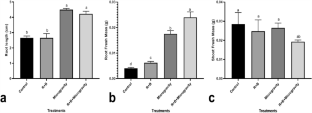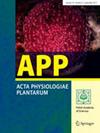Simulated microgravity improved secondary metabolism in Physalis alkekengi via influencing gene expression and DNA methylation in a light quality-dependent manner
Abstract
This study aimed to investigate the effect of microgravity and light spectral composition on DNA methylation levels and the expression of genes responsible for secondary metabolism in Physalis alkekengi. Seedlings were exposed to the microgravity treatments under two different light conditions, including white and red + blue (R + B). The microgravity treatments were more capable of rapidly influencing growth performance than the light spectrum quality. The microgravity treatment up-regulated the expression of the 7-sterol Δ7 reductase (DWF5) gene. The highest expression of 4–1-deoxy-d-xylulose-5-phosphate reductoisomerase (DXR) gene was recorded in the microgravity-treated seedlings grown under the white conditions. Microgravity treatment and R + B irradiation synergistically stimulated the 3–1-deoxy-d-xylulose-5-phosphate synthase 2 (DXS2) gene. The expression pattern of the 1-hydroxy-3-methylglutaryl coenzyme A reductase (HMGR) and 2-sterol C-7,8 isomerase (HYD1) genes was similar to that of the DXS2 gene. The transcription of the mevalonate kinase (MK) gene was slightly changed in response to the microgravity and light composition. In the microgravity-treated seedlings, the 5-squalene synthase (SQS) gene displayed a similar upward trend, whereas the R + B radiation conditions contributed to the slight down-regulation of this gene. The microgravity factor was more effective in generating epigenetic responses in terms of DNA methylation than the light spectrum quality. However, light conditions affected the molecular responses of the plant to the microgravity factor. The microgravity treatment under both radiation conditions also increased the concentration of soluble phenols and proline in leaves. These findings refer to the high efficacy of simulated microgravity conditions to up-regulate the secondary metabolism in medicinal plants.


 求助内容:
求助内容: 应助结果提醒方式:
应助结果提醒方式:


